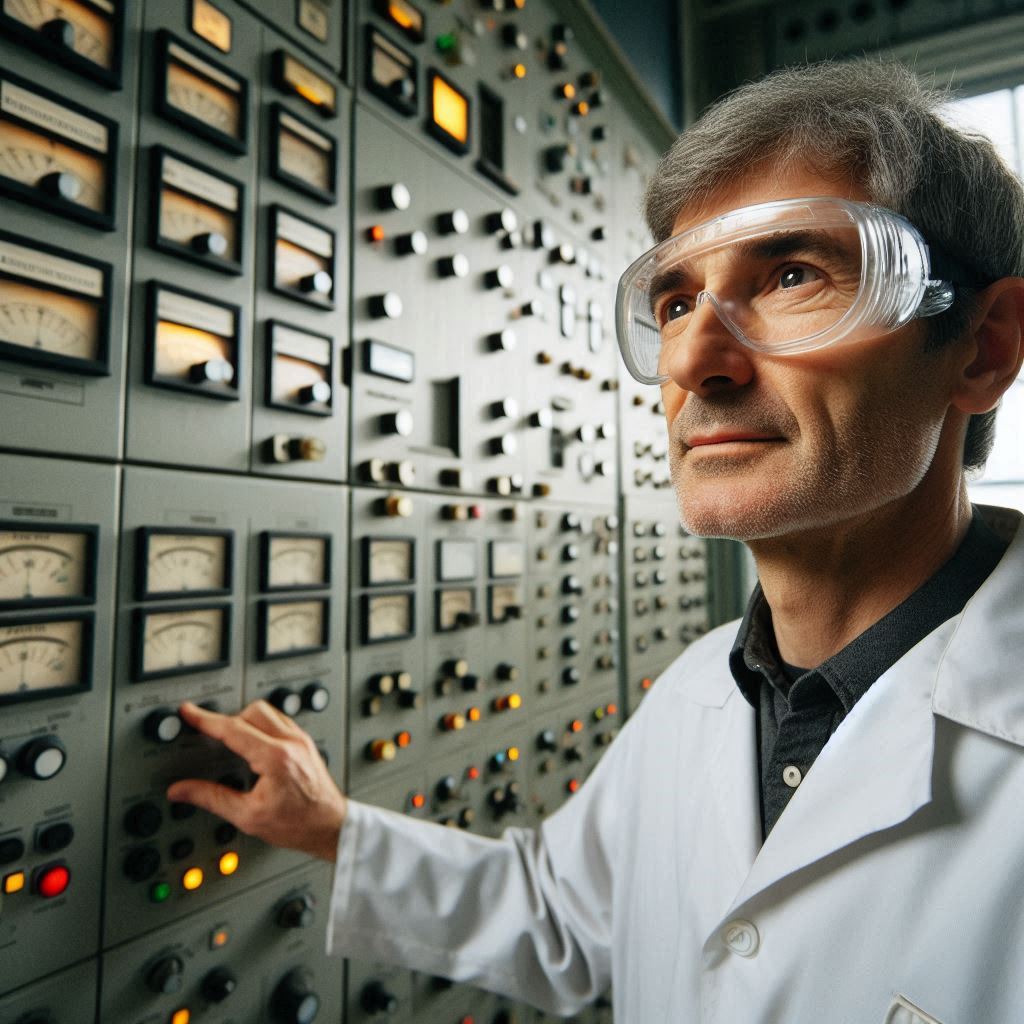Introduction
Nuclear engineers play a critical role in harnessing nuclear energy for power generation and advanced technologies in Nuclear Engineer in Sustainable Energy.
They design, develop, and maintain nuclear reactors and systems.
Their work ensures safe and efficient operation of nuclear facilities.
These engineers are also involved in managing nuclear waste and addressing environmental concerns.
In today‘s world, sustainable energy is crucial for reducing our carbon footprint and combating climate change.
As traditional fossil fuels deplete and contribute to global warming, alternative energy sources become increasingly vital.
Nuclear energy, with its low greenhouse gas emissions, offers a promising solution.
It can provide a stable and reliable power supply while minimizing environmental impact.
Nuclear engineers are at the forefront of this transition.
They innovate to improve reactor safety and efficiency, making nuclear power more viable.
Their expertise helps address energy needs while supporting environmental sustainability.
They work on advanced technologies, such as fusion reactors, which could revolutionize energy production.
The push for sustainable energy requires integrating renewable sources with traditional ones.
Nuclear energy can complement solar, wind, and hydro power, providing a balanced and reliable energy mix.
By advancing nuclear technology and ensuring its safety, nuclear engineers contribute significantly to a sustainable energy future.
Responsibilities of a Nuclear Engineer
Designing Nuclear Power Systems
After obtaining a degree, one of the primary responsibilities is designing nuclear power systems.
This involves creating designs that maximize efficiency while ensuring safety.
Engineers must use advanced simulation tools to model reactor behavior and assess performance under various conditions.
Understanding the principles of reactor operation and fuel cycle management is crucial for this role.
Monitoring and Maintaining Nuclear Reactors
Another key responsibility is monitoring and maintaining nuclear reactors.
Engineers ensure that reactors operate within safety parameters and perform regular inspections.
They analyze data from sensors and control systems to detect any anomalies.
Maintenance tasks include servicing equipment and addressing potential issues before they become critical.
Consistent monitoring helps in maintaining reactor safety and operational efficiency.
Ensuring Safety Protocols are Followed
Ensuring that safety protocols are followed is a fundamental aspect of the job.
Nuclear engineers must adhere to stringent safety regulations to protect both people and the environment.
They are responsible for implementing safety procedures and conducting safety drills.
Regular safety audits and emergency response plans are essential to mitigate risks associated with nuclear operations.
Read: The Role of Aerospace Engineers in Satellite Development
Contribution to Sustainable Energy
Nuclear energy as a clean energy source
Nuclear engineers play a crucial role in developing and maintaining nuclear power plants that provide clean energy.
Unlike fossil fuels, nuclear energy does not produce harmful carbon emissions that contribute to climate change.
This clean energy source helps to reduce air pollution and improve overall air quality, making it a viable alternative to traditional energy sources.
Reducing greenhouse gas emissions
By promoting the use of nuclear energy, nuclear engineers contribute to the reduction of greenhouse gas emissions.
Nuclear power plants do not emit carbon dioxide or other greenhouse gases during energy production, unlike coal or natural gas power plants.
This reduction in greenhouse gas emissions helps to combat climate change and its associated impacts on the environment, such as rising sea levels and more frequent extreme weather events.
Decreasing reliance on fossil fuels
As the world looks for more sustainable and environmentally friendly energy sources, nuclear energy provides a viable option for decreasing reliance on fossil fuels.
Nuclear engineers work to develop efficient nuclear power technologies that can supplement or replace traditional fossil fuel-based energy sources.
By diversifying the energy mix with nuclear power, countries can reduce their dependence on fossil fuels, which are finite resources with damaging environmental impacts.
Generally, nuclear engineers play a crucial role in promoting sustainable energy by developing and maintaining nuclear power plants as clean energy sources.
Through their efforts, they contribute to reducing greenhouse gas emissions and decreasing reliance on fossil fuels, ultimately helping to create a more sustainable and environmentally friendly energy landscape
Read: Aerospace Engineering in Commercial Spaceflight
Advantages of Nuclear Energy
Nuclear engineers play a crucial role in the development and maintenance of sustainable energy solutions.
With the increasing focus on reducing carbon emissions and combating climate change, nuclear energy has emerged as a viable alternative to traditional fossil fuel-based power generation.
High Energy Output
One of the key advantages of nuclear energy is its high energy output.
Nuclear power plants can generate a significant amount of electricity using a relatively small amount of fuel.
This high energy output makes nuclear power a cost-effective and efficient source of energy.
Consistent Power Generation
Unlike renewable energy sources such as solar and wind power, nuclear energy provides consistent and reliable power generation.
Nuclear power plants can operate 24/7, providing a stable source of electricity to meet the demands of modern society.
This reliability is essential for maintaining the stability of the electrical grid.
Low Carbon Footprint
Compared to traditional energy sources such as coal and natural gas, nuclear energy has a much lower carbon footprint.
Nuclear power plants do not produce greenhouse gas emissions during operation, making them an environmentally friendly energy option.
By reducing carbon emissions, nuclear energy plays a vital role in combating climate change and promoting sustainability.
Therefore, the advantages of nuclear energy, including high energy output, consistent power generation, and low carbon footprint, highlight the importance of nuclear engineers in developing sustainable energy solutions.
As we strive to transition to a cleaner and more sustainable energy future, nuclear energy will continue to play a crucial role in meeting the world’s growing energy needs.
Read: Essential Aerospace Engineering Textbooks

Challenges Faced by Nuclear Engineer
Safety Concerns Related to Nuclear Accidents
One crucial aspect of nuclear engineering is addressing safety concerns related to nuclear accidents.
Engineers are trained to design systems that prevent accidents and mitigate their effects.
They study past incidents, such as the Fukushima and Chernobyl disasters, to enhance safety protocols and emergency response strategies.
Proper Disposal of Nuclear Waste
Proper disposal of nuclear waste is another critical responsibility.
Engineers must develop and implement strategies for safe storage and disposal of radioactive materials.
This involves designing secure containment facilities and ensuring that waste management practices meet stringent environmental and regulatory standards.
Public Perception and Opposition to Nuclear Power
Public perception and opposition to nuclear power also impact the role of nuclear engineers.
Engineers must be prepared to engage with the public and address concerns about the safety and environmental impact of nuclear energy.
Effective communication and transparency can help build trust and support for nuclear projects.
Read: The Impact of Aerospace Engineering on Modern Life
Innovations in Nuclear Engineering
Development of small modular reactors
Small modular reactors (SMRs) are a groundbreaking technology that allows for greater flexibility in nuclear power generation.
These reactors are designed to be smaller in size compared to traditional nuclear power plants, making them easier and more cost-effective to construct.
SMRs can be deployed in different locations, including areas with limited space or where a large-scale nuclear plant may not be feasible.
This flexibility opens up new opportunities for expanding nuclear energy capacity and integrating it with the broader energy grid.
Use of advanced materials for reactor construction
Advancements in materials science have played a vital role in improving the safety and efficiency of nuclear reactors.
Engineers are constantly researching and developing new materials that can withstand the extreme conditions inside a reactor, such as high temperatures and radiation exposure.
These advanced materials not only enhance the longevity and durability of nuclear power plants but also contribute to reducing maintenance costs and downtime.
By utilizing these materials, nuclear engineers can design reactors that are more resilient and efficient, ultimately improving the overall sustainability of nuclear energy.
Transform Your Career Today
Unlock a personalized career strategy that drives real results. Get tailored advice and a roadmap designed just for you.
Start NowIntegration of renewable energy sources with nuclear power
Another innovative approach in nuclear engineering is the integration of renewable energy sources with nuclear power.
By combining nuclear power with sources like wind, solar, or hydroelectric power, engineers can create hybrid energy systems that offer a more reliable and stable energy supply.
This integration allows for better utilization of available resources, reduces reliance on fossil fuels, and mitigates the intermittency issues associated with renewable energy.
By leveraging the strengths of both nuclear and renewable energy, engineers can develop a more sustainable energy mix that meets the demands of a growing population while minimizing environmental impact.
Nuclear engineers play a crucial role in driving innovation in sustainable energy by developing new technologies, materials, and approaches that improve the efficiency, safety, and sustainability of nuclear power.
These innovations not only benefit nuclear power generation but also contribute to the broader goal of transitioning towards a more sustainable energy future.
Collaboration with Other Professions
Working with Scientists and Researchers in Renewable Energy Fields
Nuclear engineers often collaborate with scientists and researchers in renewable energy fields.
This interdisciplinary approach fosters innovative solutions that integrate nuclear energy with renewable technologies.
Working together helps in developing hybrid systems that maximize energy efficiency and sustainability.
By combining expertise, engineers can address energy challenges more comprehensively.
Consulting with Environmental Experts on Sustainable Practices
Consulting with environmental experts is crucial for ensuring sustainable nuclear energy practices.
Environmental experts provide valuable insights into minimizing ecological impacts and enhancing safety measures.
Nuclear engineers use this advice to implement best practices for waste management, site selection, and radiation protection.
Effective collaboration helps in achieving regulatory compliance and public trust.
Engaging with Policymakers to Advocate for Nuclear Energy
Engaging with policymakers is essential for advocating nuclear energy‘s role in sustainable development.
Nuclear engineers work to inform and influence policy decisions regarding energy strategies and regulations.
They provide data and expertise to support the benefits of nuclear power, such as low greenhouse gas emissions and reliable energy supply.
Active involvement helps shape favorable policies and public perceptions.
Gain More Insights: Common Challenges Faced by Data Scientists Today
Delve into the Subject: Benefits of a Career in Transportation Engineering
Education and Training Requirements
Bachelor’s Degree in Nuclear Engineering or Related Field
To begin a career as a nuclear engineer, you need a bachelor’s degree in nuclear engineering or a closely related field.
This degree covers essential subjects such as reactor physics, thermal hydraulics, and radiation safety.
It includes rigorous coursework in advanced mathematics, fluid dynamics, and material science.
Hands-on laboratory work and internships provide practical experience, complementing theoretical knowledge.
By the end of the program, students should be well-prepared to tackle complex engineering problems in nuclear energy.
Licensing and Certification Requirements
After earning your degree, obtaining proper licensing and certification is crucial.
In many regions, nuclear engineers are required to obtain a Professional Engineer (PE) license.
This process begins with passing the Fundamentals of Engineering (FE) exam, which assesses your understanding of basic engineering concepts.
Next, you gain relevant work experience, often under the supervision of a licensed engineer.
Finally, passing the Professional Engineering exam, which focuses on nuclear engineering topics, is necessary to become fully licensed.
Additionally, certifications from professional organizations, such as the American Nuclear Society (ANS), can further validate your expertise.
These credentials are beneficial for specialized roles and advanced career opportunities.
Continuing Education to Stay Updated on Industry Advancements
Continuing education is vital for nuclear engineers to stay current with industry advancements.
The field of nuclear engineering is continually evolving, with new technologies and regulatory changes emerging frequently.
Engaging in lifelong learning is essential to maintain a competitive edge.
Enrolling in professional development courses, attending industry conferences, and participating in workshops can keep your skills and knowledge up to date.
Reading scientific journals and publications helps you stay informed about recent research and technological innovations.
For those seeking to advance their careers, pursuing a master‘s or doctoral degree in specialized areas, such as nuclear fusion or reactor design, can provide deeper insights and open new opportunities.
Conclusion
Nuclear engineers play a crucial role in promoting sustainable energy through their expertise and innovation.
By designing, developing, and maintaining nuclear power plants, they contribute to reducing reliance on fossil fuels and mitigating climate change.
It is essential to recognize the significant impact that nuclear engineers have on transitioning towards a greener and cleaner future.
Their work not only diversifies the energy mix but also provides a reliable and efficient source of power that can meet the increasing global energy demand.
Nuclear engineers are instrumental in ensuring the safe and effective operation of nuclear power plants, which generate clean energy without greenhouse gas emissions.
Their skills and knowledge are essential for advancing nuclear technology and making significant contributions to sustainable development.
As the world continues to shift towards renewable and sustainable energy sources, there is a growing demand for skilled professionals in the field of nuclear engineering.
By choosing this career path, individuals can actively contribute to addressing climate change, reducing environmental impact, and shaping a more sustainable future for generations to come.
[E-Books for Sale]
The Big Book of 500 High-Paying Jobs in America: Unlock Your Earning Potential
$19.99 • 500 High-Paying Jobs • 330 pages
Explore 500 high-paying jobs in America and learn how to boost your career, earn more, and achieve success!
See All 500 High-Paying Jobs of this E-Book
1001 Professions Without a Degree: High-Paying American Jobs You Can Start Now
$19.99 • 1001 Professions Without a Degree • 174 pages
Discover 1001 high-paying jobs without a degree! Unlock career tips, skills, and success strategies for just $19.99!




